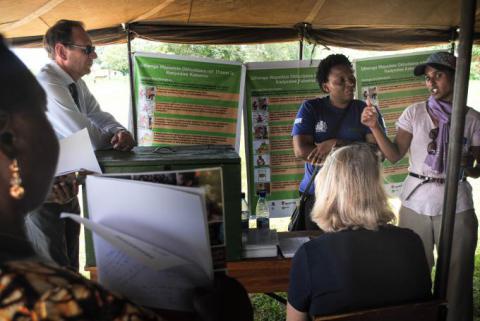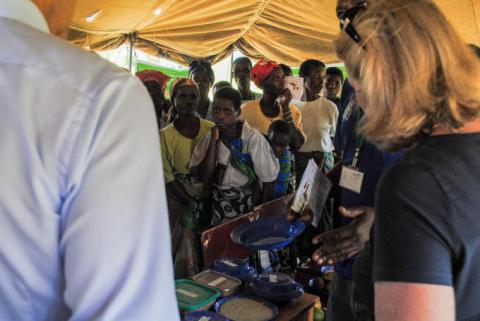INGO Cash Transfer Programme Learning Event: Mchinji District – 12th Feb 2015
On 12th February 2015, a delegation of donors, INGO partners, the UN, private sector and other development partners attended a Learning Event in Mchinji on the MVAC Emergency Cash Transfer response which is funded by the Royal Norwegian Embassy, Irish Aid and Save the Children Italy. The event was co-hosted by INGO partners Concern Worldwide and Save the Childrenat the Kamwendo Model School in Traditional Authority (TA) Kamwendo, Mchinji District. Representing government departments were guests from the German Embassy, Irish Embassy, the PS for the Department of Disaster Management Affairs (DoDMA) and the District Representative for TA Zulu. From the private sector, representatives were present from Standard Bank and the programme’s implementing partner, Airtel. The event served as a means to demonstrate details of the emergency response, including objectives, aspirations, good practices and lessons learnt; and act as a forum for an exchange of constructive feedback.
The MVAC emergency cash transfer programme commenced in December 2014 and is expected to run until March 2015. As of January, 10,735 households have been reached –and by the end of the programme, the total target of 44,926 households will be met. The consortium, consisting of lead organization Save the Children, Oxfam, Goal Malawi, Concern Universal, Concern Worldwide and Christian Aid are responding in 10 districts based on findings from the MVAC’s2013/14 assessment that 640,009 households will be food insecure during the lean season between December and March. However, it is expected that the lean season may be prolonged due to the recent late rains and devastating floods. Depending on DoDMA’s assessment of the situation, this may require the Cash Transfer Programme to be extended for at least an additional month.
The Cash Transfer Programme aims at addressing short-term emergency food needs for vulnerable households through monthly cash transfers and aims at creating links with longer-term programmes in order to build household resilience. The provision of cash is designed to promote household flexibility, choice and dignity in an environment of functioning commodity markets. The links to longer term programmes have been designed to help households create a stronger buffer to cushion future shocks. Special emphasis has been placed on creating links with Village Savings and Loans (VSL) groups, nutrition programmes and the promotion of fuel-efficient technologies.
The Learning Event demonstrated how monthly transfers of cash can be delivered electronically through mobile phones. The Delegation was shown how beneficiaries could ‘cash out’ money from local agents once the amount had been ‘blasted’ by Airtel. They were also shown a solution of a manual cash distribution process in instances where beneficiaries were unable to cash out from local agents due to challenges of network, literacy or liquidity. In addition, the complaints response mechanism was demonstrated to show how beneficiary and non-beneficiary complaints and feedback is recorded and dealt with.

Photo Caption: Selvi Vikan from Save the Children explaining the Cash Transfer Programme’s, Complaints and Feedback Mechanism.
With respect to links with longer term resilience programmes, the delegation was shown examples of a community VSL group in session; a nutrition awareness and interactive cooking demonstration to highlight the importance of dietary diversity and use of local ingredients; and promotion of fuel efficient stoves by comparing benefits of fuel-efficient methods versus traditional methods.

Photo Caption: Learning Event guests, Bjarne Garden of the Royal Norwegian Embassy and Aine Hearns of the Irish Embassy viewing a demonstration on nutrition and dietary diversification.
The Learning Event promoted an interactive style where the delegation could witness the activities, ask questions and provide feedback on immediate impressions. A debrief event was also organised following the event to allow for more in-depth discussions of what was working, what could be improved and what could be taken forward for future emergency programmes.
On reflecting on the programme, Bjarne Garden, Head of Development at the Royal Norwegian Embassy commented that, “we hope to reach the most vulnerable and the poorest in a cost-effective way, so that our inputs can benefit as many as possible. We anticipate that the intervention will build resilience and limit effects from future shocks.” Further reflections included the effective coordination, collaboration and learning between the INGO consortium members; and the potential of cash transfers and electronic payments in emergencies in light of security and multiplier effects. Delegation members expressed an interest to continue the learning in order to further develop innovations in response to food insecurity in emergencies.
 Malawi
Malawi